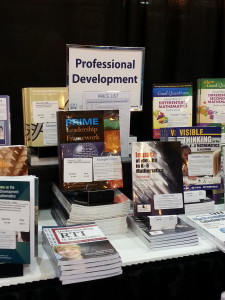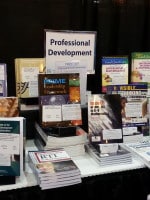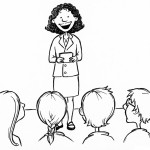 On Sunday, April 13th, I attended the final session time of the Organization of American Historians Conference in Atlanta. Sunday is very quiet with many attendees heading home. I decided to attend the Educating Future History Teachers session. I wanted to see what was being done to prepare teacher candidates now compared to my program 7-9 years ago. The session featured professors and Instructors from North Carolina, Arizona, Pennsylvania, and Michigan. I found it interesting to compare what was happening in these other states versus what I had experienced as a teacher candidate in a Georgia university. When I began teaching, I was prepared in several areas like my subject area content and writing lessons, but not necessarily in areas of pedagogy and fieldwork. Several K-12 teachers attending the session felt similarly.
On Sunday, April 13th, I attended the final session time of the Organization of American Historians Conference in Atlanta. Sunday is very quiet with many attendees heading home. I decided to attend the Educating Future History Teachers session. I wanted to see what was being done to prepare teacher candidates now compared to my program 7-9 years ago. The session featured professors and Instructors from North Carolina, Arizona, Pennsylvania, and Michigan. I found it interesting to compare what was happening in these other states versus what I had experienced as a teacher candidate in a Georgia university. When I began teaching, I was prepared in several areas like my subject area content and writing lessons, but not necessarily in areas of pedagogy and fieldwork. Several K-12 teachers attending the session felt similarly.
Takeaways from the Educating Future History Teachers session (not in any order)
- Program should allow education program students different chances for work like tutoring freshmen, etc.
- It is important to spend time integrating primary sources into lessons and critical reading of those sources.
- Why do we collaborate? Personal connections, respect, shared thinking.
- Money alone cannot sustain successful partnerships.
- There needs to be a chance to have teacher educators, teachers, and pre-service talk and engage.
- Institutions in Michigan (except MSU and UM) have Social Studies program housed within content department.
- Northern Arizona has students do projects that allow them to practice history so they can put it in the classroom.
- N. Arizona focuses on Content, Pedagogy, and Practice. Learn to be historian but turn around and teach it.
- These program ideas make me wish my own education was a little different.
- Collaborate with English department to help your students in the Social Studies classroom.
- Also a focus on different teaching skills. New teachers are now better prepared.
- Teaching World History course is a lab class. Lesson plans for all of World History include goals they can use immediately.
- New teacher will likely face: large classes, different levels of achievement, poverty/dysfunctional homes, state tests.
- Improved student performance? Changes at Western Carolina show improvement of training teachers for SS classroom.
- Wanted collaboration. To address worries about teaching World History & Civics/Government, two specific classes for students.
- Increased GPA. Increased time in the field for History/SS education students. Content specific courses.
- Former and current students reported that they didn’t feel prepared to teach. (those surveyed at Western Carolina)
- Mention of how some Learning Focus Schools EQ’s are not critical thinking inducing.
- A Program must show students any possible constraints they may face as educators.
Final Thoughts on the Conference
I am very glad I got the chance to attend this conference. I am a history nut so many of the things I heard or read at the conference appealed to me. While speaking to a fellow attendee, I learned that there seems to be a push to close the gap between college/university level educators and K-12 educators by offering more relatable sessions for teachers to attend. There is obviously still work to be done since most of the sessions were content or historian/field specific sessions, but I think that, as Social Studies educators, that this kind of conference, in addition to conferences like the National Council for the Social Studies annual conference, is a great way for educators and other professionals to connect, network, and share ideas. Would I go back? Definitely, with some better planning since I lived outside of the city. It was also worth it. I made many connections, learned some interesting things, and renewed my love of history. That makes it all worthwhile.
_________________________________________________________________________________________
Below you can find a link to Storify (great resource to check out) of my #OAH2014 tweets to see more of what I saw and thought.
[/fusion_builder_column][/fusion_builder_row][/fusion_builder_container]





